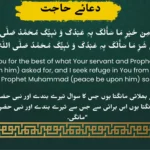Surah Al-Fatiha, the opening chapter of the Holy Quran, holds immense importance in Islam. Among its seven powerful verses, the fifth verse, iyyaka na’budu wa iyyaka nastaeen (إِيَّاكَ نَعْبُدُ وَإِيَّاكَ نَسْتَعِينُ), encapsulates the essence of worship and reliance on Allah. Let’s delve deeply into this verse, exploring its meaning, significance, and the lessons it imparts.
| Radhitu Billahi Rabba Wabil Islami Dina |
| Astaghfar Dua: Meaning, Benefits & How to Recite |
| dua ahad- دعاء العهد |
| Dua Khatam Quran- Dua after finishing the Quran |
Surah Fatiha Verse 5 iyyaka na’budu wa iyyaka nastaeen
Arabic Text:
إِيَّاكَ نَعْبُدُ وَإِيَّاكَ نَسْتَعِينُ
English Translation:
“You alone we worship, and You alone we ask for help.”
Urdu Translation:
“ہم صرف تیری ہی عبادت کرتے ہیں اور صرف تجھ ہی سے مدد مانگتے ہیں۔”
This verse succinctly conveys the essence of Tawheed (the oneness of Allah) and our complete dependence on Him.
Breaking Down the Verse: Word by Word
1. Iyyaka Nabudu (إِيَّاكَ نَعْبُدُ)
Meaning:
“You alone we worship.”
This part of the verse establishes our exclusive devotion to Allah. Worship here encompasses not just acts of prayer but a way of life aligned with Allah’s commands.
Key Lessons:
- Exclusive Devotion: Worship should be directed solely toward Allah, free from any association with others.
- Submission: This phrase is a declaration of submission to Allah’s authority.
2. Iyyaka Nastaeen (وَإِيَّاكَ نَسْتَعِينُ)
Meaning:
“You alone we ask for help.”
This part of the verse highlights our reliance on Allah for assistance in every aspect of life, whether material or spiritual.
Key Lessons:
- Complete Trust: Depend on Allah alone for guidance and support.
- Acknowledgment of His Power: Recognizing Allah as the ultimate helper.
The Context in Surah Al-Fatiha
Surah Al-Fatiha is often referred to as the “Opening” or “The Mother of the Quran” because it encompasses the core themes of the Quran, including Allah’s sovereignty, mercy, and guidance.
The placement of “Iyyaka Nabudu wa Iyyaka Nastaeen” at the heart of the Surah underscores its dual themes of worship and reliance, forming the foundation of a believer’s relationship with Allah.
Importance of the Verse in Daily Life
1. In Salah (Prayer):
This verse is recited in every unit of Salah, reaffirming our commitment to Allah multiple times a day.
2. Guidance in Challenges:
Whether facing hardships or making decisions, this verse reminds us to turn to Allah for assistance.
3. Strengthening Faith:
It helps Muslims maintain their focus on Allah, steering away from distractions and false dependencies.
Practical Implications of the Verse
a) Living a Life of Worship
Worship extends beyond rituals; it includes actions, intentions, and thoughts that align with Allah’s teachings.
b) Relying on Allah in Adversity
Instead of succumbing to despair or seeking help from improper sources, believers are encouraged to place their trust in Allah.
c) Balancing Effort and Reliance
While we must strive for success, this verse reminds us that the ultimate outcome is in Allah’s hands.
FAQs
This verse signifies the essence of Tawheed, emphasizing exclusive worship of Allah and complete reliance on Him for all needs.
The verse is recited in every unit of Salah, reminding Muslims of their commitment to worship and reliance on Allah throughout the day.
It teaches Muslims to rely solely on Allah for assistance, recognizing His power as the ultimate source of help in all aspects of life.
Conclusion
The verse “iyyaka na’budu wa iyyaka nastaeen” from Surah Al-Fatiha serves as a cornerstone of a Muslim’s faith and practice. By internalizing its meaning and applying its lessons, believers can strengthen their connection with Allah, lead a life of worship, and navigate challenges with divine guidance. May Allah guide us all to truly understand and embody this powerful verse in our lives. Ameen.




